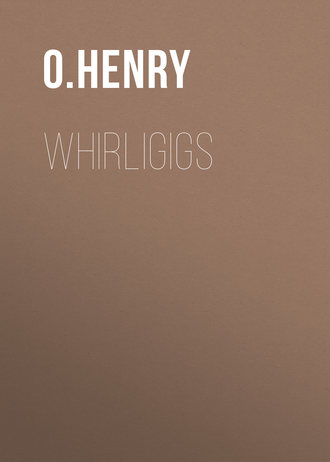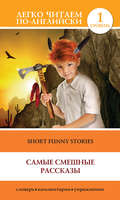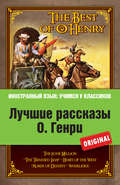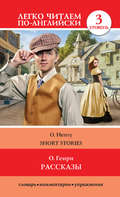
О. Генри
Whirligigs
XVI
THE SONG AND THE SERGEANT
Half a dozen people supping at a table in one of the upper-Broadway all-night restaurants were making too much noise. Three times the manager walked past them with a politely warning glance; but their argument had waxed too warm to be quelled by a manager's gaze. It was midnight, and the restaurant was filled with patrons from the theatres of that district. Some among the dispersed audiences must have recognized among the quarrelsome sextet the faces of the players belonging to the Carroll Comedy Company.
Four of the six made up the company. Another was the author of the comedietta, "A Gay Coquette," which the quartette of players had been presenting with fair success at several vaudeville houses in the city. The sixth at the table was a person inconsequent in the realm of art, but one at whose bidding many lobsters had perished.
Loudly the six maintained their clamorous debate. No one of the Party was silent except when answers were stormed from him by the excited ones. That was the comedian of "A Gay Coquette." He was a young man with a face even too melancholy for his profession.
The oral warfare of four immoderate tongues was directed at Miss Clarice Carroll, the twinkling star of the small aggregation. Excepting the downcast comedian, all members of the party united in casting upon her with vehemence the blame of some momentous misfortune. Fifty times they told her: "It is your fault, Clarice – it is you alone who spoilt the scene. It is only of late that you have acted this way. At this rate the sketch will have to be taken off."
Miss Carroll was a match for any four. Gallic ancestry gave her a vivacity that could easily mount to fury. Her large eyes flashed a scorching denial at her accusers. Her slender, eloquent arms constantly menaced the tableware. Her high, clear soprano voice rose to what would have been a scream had it not possessed so pure a musical quality. She hurled back at the attacking four their denunciations in tones sweet, but of too great carrying power for a Broadway restaurant.
Finally they exhausted her patience both as a woman and an artist. She sprang up like a panther, managed to smash half a dozen plates and glasses with one royal sweep of her arm, and defied her critics. They rose and wrangled more loudly. The comedian sighed and looked a trifle sadder and disinterested. The manager came tripping and suggested peace. He was told to go to the popular synonym for war so promptly that the affair might have happened at The Hague.
Thus was the manager angered. He made a sign with his hand and a waiter slipped out of the door. In twenty minutes the party of six was in a police station facing a grizzled and philosophical desk sergeant.
"Disorderly conduct in a restaurant," said the policeman who had brought the party in.
The author of "A Gay Coquette" stepped to the front. He wore nose-glasses and evening clothes, even if his shoes had been tans before they met the patent-leather-polish bottle.
"Mr. Sergeant," said he, out of his throat, like Actor Irving, "I would like to protest against this arrest. The company of actors who are performing in a little play that I have written, in company with a friend and myself were having a little supper. We became deeply interested in the discussion as to which one of the cast is responsible for a scene in the sketch that lately has fallen so flat that the piece is about to become a failure. We may have been rather noisy and intolerant of interruption by the restaurant people; but the matter was of considerable importance to all of us. You see that we are sober and are not the kind of people who desire to raise disturbances. I hope that the case will not be pressed and that we may be allowed to go."
"Who makes the charge?" asked the sergeant.
"Me," said a white-aproned voice in the rear. "De restaurant sent me to. De gang was raisin' a rough-house and breakin' dishes."
"The dishes were paid for," said the playwright. "They were not broken purposely. In her anger, because we remonstrated with her for spoiling the scene, Miss – "
"It's not true, sergeant," cried the clear voice of Miss Clarice Carroll. In a long coat of tan silk and a red-plumed hat, she bounded before the desk.
"It's not my fault," she cried indignantly. "How dare they say such a thing! I've played the title rôle ever since it was staged, and if you want to know who made it a success, ask the public – that's all."
"What Miss Carroll says is true in part," said the author. "For five months the comedietta was a drawing-card in the best houses. But during the last two weeks it has lost favour. There is one scene in it in which Miss Carroll made a big hit. Now she hardly gets a hand out of it. She spoils it by acting it entirely different from her old way."
"It is not my fault," reiterated the actress.
"There are only two of you on in the scene," argued the playwright hotly, "you and Delmars, here – "
"Then it's his fault," declared Miss Carroll, with a lightning glance of scorn from her dark eyes. The comedian caught it, and gazed with increased melancholy at the panels of the sergeant's desk.
The night was a dull one in that particular police station.
The sergeant's long-blunted curiosity awoke a little.
"I've heard you," he said to the author. And then he addressed the thin-faced and ascetic-looking lady of the company who played "Aunt Turnip-top" in the little comedy.
"Who do you think spoils the scene you are fussing about?" he asked.
"I'm no knocker," said that lady, "and everybody knows it. So, when I say that Clarice falls down every time in that scene I'm judging her art and not herself. She was great in it once. She does it something fierce now. It'll dope the show if she keeps it up."
The sergeant looked at the comedian.
"You and the lady have this scene together, I understand. I suppose there's no use asking you which one of you queers it?"
The comedian avoided the direct rays from the two fixed stars of Miss Carroll's eyes.
"I don't know," he said, looking down at his patent-leather toes.
"Are you one of the actors?" asked the sergeant of a dwarfish youth with a middle-aged face.
"Why, say!" replied the last Thespian witness, "you don't notice any tin spear in my hands, do you? You haven't heard me shout: 'See, the Emperor comes!' since I've been in here, have you? I guess I'm on the stage long enough for 'em not to start a panic by mistaking me for a thin curl of smoke rising above the footlights."
"In your opinion, if you've got one," said the sergeant, "is the frost that gathers on the scene in question the work of the lady or the gentleman who takes part in it?"
The middle-aged youth looked pained.
"I regret to say," he answered, "that Miss Carroll seems to have lost her grip on that scene. She's all right in the rest of the play, but – but I tell you, sergeant, she can do it – she has done it equal to any of 'em – and she can do it again."
Miss Carroll ran forward, glowing and palpitating.
"Thank you, Jimmy, for the first good word I've had in many a day," she cried. And then she turned her eager face toward the desk.
"I'll show you, sergeant, whether I am to blame. I'll show them whether I can do that scene. Come, Mr. Delmars; let us begin. You will let us, won't you, sergeant?"
"How long will it take?" asked the sergeant, dubiously.
"Eight minutes," said the playwright. "The entire play consumes but thirty."
"You may go ahead," said the sergeant. "Most of you seem to side against the little lady. Maybe she had a right to crack up a saucer or two in that restaurant. We'll see how she does the turn before we take that up."
The matron of the police station had been standing near, listening to the singular argument. She came nigher and stood near the sergeant's chair. Two or three of the reserves strolled in, big and yawning.
"Before beginning the scene," said the playwright, "and assuming that you have not seen a production of 'A Gay Coquette,' I will make a brief but necessary explanation. It is a musical-farce-comedy – burlesque-comedietta. As the title implies, Miss Carroll's rôle is that of a gay, rollicking, mischievous, heartless coquette. She sustains that character throughout the entire comedy part of the production. And I have designed the extravaganza features so that she may preserve and present the same coquettish idea.
"Now, the scene in which we take exception to Miss Carroll's acting is called the 'gorilla dance.' She is costumed to represent a wood nymph, and there is a great song-and-dance scene with a gorilla – played by Mr. Delmars, the comedian. A tropical-forest stage is set.
"That used to get four and five recalls. The main thing was the acting and the dance – it was the funniest thing in New York for five months. Delmars's song, 'I'll Woo Thee to My Sylvan Home,' while he and Miss Carroll were cutting hide-and-seek capers among the tropical plants, was a winner."
"What's the trouble with the scene now?" asked the sergeant.
"Miss Carroll spoils it right in the middle of it," said the playwright wrathfully.
With a wide gesture of her ever-moving arms the actress waved back the little group of spectators, leaving a space in front of the desk for the scene of her vindication or fall. Then she whipped off her long tan cloak and tossed it across the arm of the policeman who still stood officially among them.
Miss Carroll had gone to supper well cloaked, but in the costume of the tropic wood nymph. A skirt of fern leaves touched her knee; she was like a humming-bird – green and golden and purple.
And then she danced a fluttering, fantastic dance, so agile and light and mazy in her steps that the other three members of the Carroll Comedy Company broke into applause at the art of it.
And at the proper time Delmars leaped out at her side, mimicking the uncouth, hideous bounds of the gorilla so funnily that the grizzled sergeant himself gave a short laugh like the closing of a padlock. They danced together the gorilla dance, and won a hand from all.
Then began the most fantastic part of the scene – the wooing of the nymph by the gorilla. It was a kind of dance itself – eccentric and prankish, with the nymph in coquettish and seductive retreat, followed by the gorilla as he sang "I'll Woo Thee to My Sylvan Home."
The song was a lyric of merit. The words were non-sense, as befitted the play, but the music was worthy of something better. Delmars struck into it in a rich tenor that owned a quality that shamed the flippant words.
During one verse of the song the wood nymph performed the grotesque evolutions designed for the scene. At the middle of the second verse she stood still, with a strange look on her face, seeming to gaze dreamily into the depths of the scenic forest. The gorilla's last leap had brought him to her feet, and there he knelt, holding her hand, until he had finished the haunting-lyric that was set in the absurd comedy like a diamond in a piece of putty.
When Delmars ceased Miss Carroll started, and covered a sudden flow of tears with both hands.
"There!" cried the playwright, gesticulating with violence; "there you have it, sergeant. For two weeks she has spoiled that scene in just that manner at every performance. I have begged her to consider that it is not Ophelia or Juliet that she is playing. Do you wonder now at our impatience? Tears for the gorilla song! The play is lost!"
Out of her bewitchment, whatever it was, the wood nymph flared suddenly, and pointed a desperate finger at Delmars.
"It is you – you who have done this," she cried wildly. "You never sang that song that way until lately. It is your doing."
"I give it up," said the sergeant.
And then the gray-haired matron of the police station came forward from behind the sergeant's chair.
"Must an old woman teach you all?" she said. She went up to Miss Carroll and took her hand.
"The man's wearing his heart out for you, my dear. Couldn't you tell it the first note you heard him sing? All of his monkey flip-flops wouldn't have kept it from me. Must you be deaf as well as blind? That's why you couldn't act your part, child. Do you love him or must he be a gorilla for the rest of his days?"
Miss Carroll whirled around and caught Delmars with a lightning glance of her eye. He came toward her, melancholy.
"Did you hear, Mr. Delmars?" she asked, with a catching breath.
"I did," said the comedian. "It is true. I didn't think there was any use. I tried to let you know with the song."
"Silly!" said the matron; "why didn't you speak?"
"No, no," cried the wood nymph, "his way was the best. I didn't know, but – it was just what I wanted, Bobby."
She sprang like a green grasshopper; and the comedian opened his arms, and – smiled.
"Get out of this," roared the desk sergeant to the waiting waiter from the restaurant. "There's nothing doing here for you."
XVII
ONE DOLLAR'S WORTH
The judge of the United States court of the district lying along the Rio Grande border found the following letter one morning in his mail:
JUDGE:
When you sent me up for four years you made a talk. Among other hard things, you called me a rattlesnake. Maybe I am one – anyhow, you hear me rattling now. One year after I got to the pen, my daughter died of – well, they said it was poverty and the disgrace together. You've got a daughter, Judge, and I'm going to make you know how it feels to lose one. And I'm going to bite that district attorney that spoke against me. I'm free now, and I guess I've turned to rattlesnake all right. I feel like one. I don't say much, but this is my rattle. Look out when I strike.
Yours respectfully,RATTLESNAKE.
Judge Derwent threw the letter carelessly aside. It was nothing new to receive such epistles from desperate men whom he had been called upon to judge. He felt no alarm. Later on he showed the letter to Littlefield, the young district attorney, for Littlefield's name was included in the threat, and the judge was punctilious in matters between himself and his fellow men.
Littlefield honoured the rattle of the writer, as far as it concerned himself, with a smile of contempt; but he frowned a little over the reference to the Judge's daughter, for he and Nancy Derwent were to be married in the fall.
Littlefield went to the clerk of the court and looked over the records with him. They decided that the letter might have been sent by Mexico Sam, a half-breed border desperado who had been imprisoned for manslaughter four years before. Then official duties crowded the matter from his mind, and the rattle of the revengeful serpent was forgotten.
Court was in session at Brownsville. Most of the cases to be tried were charges of smuggling, counterfeiting, post-office robberies, and violations of Federal laws along the border. One case was that of a young Mexican, Rafael Ortiz, who had been rounded up by a clever deputy marshal in the act of passing a counterfeit silver dollar. He had been suspected of many such deviations from rectitude, but this was the first time that anything provable had been fixed upon him. Ortiz languished cozily in jail, smoking brown cigarettes and waiting for trial. Kilpatrick, the deputy, brought the counterfeit dollar and handed it to the district attorney in his office in the court-house. The deputy and a reputable druggist were prepared to swear that Ortiz paid for a bottle of medicine with it. The coin was a poor counterfeit, soft, dull-looking, and made principally of lead. It was the day before the morning on which the docket would reach the case of Ortiz, and the district attorney was preparing himself for trial.
"Not much need of having in high-priced experts to prove the coin's queer, is there, Kil?" smiled Littlefield, as he thumped the dollar down upon the table, where it fell with no more ring than would have come from a lump of putty.
"I guess the Greaser's as good as behind the bars," said the deputy, easing up his holsters. "You've got him dead. If it had been just one time, these Mexicans can't tell good money from bad; but this little yaller rascal belongs to a gang of counterfeiters, I know. This is the first time I've been able to catch him doing the trick. He's got a girl down there in them Mexican jacals on the river bank. I seen her one day when I was watching him. She's as pretty as a red heifer in a flower bed."
Littlefield shoved the counterfeit dollar into his pocket, and slipped his memoranda of the case into an envelope. Just then a bright, winsome face, as frank and jolly as a boy's, appeared in the doorway, and in walked Nancy Derwent.
"Oh, Bob, didn't court adjourn at twelve to-day until to-morrow?" she asked of Littlefield.
"It did," said the district attorney, "and I'm very glad of it. I've got a lot of rulings to look up, and – "
"Now, that's just like you. I wonder you and father don't turn to law books or rulings or something! I want you to take me out plover-shooting this afternoon. Long Prairie is just alive with them. Don't say no, please! I want to try my new twelve-bore hammerless. I've sent to the livery stable to engage Fly and Bess for the buckboard; they stand fire so nicely. I was sure you would go."
They were to be married in the fall. The glamour was at its height. The plovers won the day – or, rather, the afternoon – over the calf-bound authorities. Littlefield began to put his papers away.
There was a knock at the door. Kilpatrick answered it. A beautiful, dark-eyed girl with a skin tinged with the faintest lemon colour walked into the room. A black shawl was thrown over her head and wound once around her neck.
She began to talk in Spanish, a voluble, mournful stream of melancholy music. Littlefield did not understand Spanish. The deputy did, and he translated her talk by portions, at intervals holding up his hand to check the flow of her words.
"She came to see you, Mr. Littlefield. Her name's Joya Treviñas. She wants to see you about – well, she's mixed up with that Rafael Ortiz. She's his – she's his girl. She says he's innocent. She says she made the money and got him to pass it. Don't you believe her, Mr. Littlefield. That's the way with these Mexican girls; they'll lie, steal, or kill for a fellow when they get stuck on him. Never trust a woman that's in love!"
"Mr. Kilpatrick!"
Nancy Derwent's indignant exclamation caused the deputy to flounder for a moment in attempting to explain that he had misquoted his own sentiments, and then he went on with the translation:
"She says she's willing to take his place in the jail if you'll let him out. She says she was down sick with the fever, and the doctor said she'd die if she didn't have medicine. That's why he passed the lead dollar on the drug store. She says it saved her life. This Rafael seems to be her honey, all right; there's a lot of stuff in her talk about love and such things that you don't want to hear."
It was an old story to the district attorney.
"Tell her," said he, "that I can do nothing. The case comes up in the morning, and he will have to make his fight before the court."
Nancy Derwent was not so hardened. She was looking with sympathetic interest at Joya Treviñas and at Littlefield alternately. The deputy repeated the district attorney's words to the girl. She spoke a sentence or two in a low voice, pulled her shawl closely about her face, and left the room.
"What did she say then?" asked the district attorney.
"Nothing special," said the deputy. "She said: 'If the life of the one' – let's see how it went – 'Si la vida de ella a quien tu amas– if the life of the girl you love is ever in danger, remember Rafael Ortiz.'"
Kilpatrick strolled out through the corridor in the direction of the marshal's office.
"Can't you do anything for them, Bob?" asked Nancy. "It's such a little thing – just one counterfeit dollar – to ruin the happiness of two lives! She was in danger of death, and he did it to save her. Doesn't the law know the feeling of pity?"
"It hasn't a place in jurisprudence, Nan," said Littlefield, "especially in re the district attorney's duty. I'll promise you that the prosecution will not be vindictive; but the man is as good as convicted when the case is called. Witnesses will swear to his passing the bad dollar which I have in my pocket at this moment as 'Exhibit A.' There are no Mexicans on the jury, and it will vote Mr. Greaser guilty without leaving the box."
The plover-shooting was fine that afternoon, and in the excitement of the sport the case of Rafael and the grief of Joya Treviñas was forgotten. The district attorney and Nancy Derwent drove out from the town three miles along a smooth, grassy road, and then struck across a rolling prairie toward a heavy line of timber on Piedra Creek. Beyond this creek lay Long Prairie, the favourite haunt of the plover. As they were nearing the creek they heard the galloping of a horse to their right, and saw a man with black hair and a swarthy face riding toward the woods at a tangent, as if he had come up behind them.
"I've seen that fellow somewhere," said Littlefield, who had a memory for faces, "but I can't exactly place him. Some ranchman, I suppose, taking a short cut home."
They spent an hour on Long Prairie, shooting from the buckboard. Nancy Derwent, an active, outdoor Western girl, was pleased with her twelve-bore. She had bagged within two brace of her companion's score.
They started homeward at a gentle trot. When within a hundred yards of Piedra Creek a man rode out of the timber directly toward them.
"It looks like the man we saw coming over," remarked Miss Derwent.
As the distance between them lessened, the district attorney suddenly pulled up his team sharply, with his eyes fixed upon the advancing horseman. That individual had drawn a Winchester from its scabbard on his saddle and thrown it over his arm.
"Now I know you, Mexico Sam!" muttered Littlefield to himself. "It was you who shook your rattles in that gentle epistle."
Mexico Sam did not leave things long in doubt. He had a nice eye in all matters relating to firearms, so when he was within good rifle range, but outside of danger from No. 8 shot, he threw up his Winchester and opened fire upon the occupants of the buckboard.
The first shot cracked the back of the seat within the two-inch space between the shoulders of Littlefield and Miss Derwent. The next went through the dashboard and Littlefield's trouser leg.
The district attorney hustled Nancy out of the buck-board to the ground. She was a little pale, but asked no questions. She had the frontier instinct that accepts conditions in an emergency without superfluous argument. They kept their guns in hand, and Littlefield hastily gathered some handfuls of cartridges from the pasteboard box on the seat and crowded them into his pockets.
"Keep behind the horses, Nan," he commanded. "That fellow is a ruffian I sent to prison once. He's trying to get even. He knows our shot won't hurt him at that distance."
"All right, Bob," said Nancy steadily. "I'm not afraid. But you come close, too. Whoa, Bess; stand still, now!"
She stroked Bess's mane. Littlefield stood with his gun ready, praying that the desperado would come within range.
But Mexico Sam was playing his vendetta along safe lines. He was a bird of different feather from the plover. His accurate eye drew an imaginary line of circumference around the area of danger from bird-shot, and upon this line lie rode. His horse wheeled to the right, and as his victims rounded to the safe side of their equine breast-work he sent a ball through the district attorney's hat. Once he miscalculated in making a détour, and over-stepped his margin. Littlefield's gun flashed, and Mexico Sam ducked his head to the harmless patter of the shot. A few of them stung his horse, which pranced promptly back to the safety line.
The desperado fired again. A little cry came from Nancy Derwent. Littlefield whirled, with blazing eyes, and saw the blood trickling down her cheek.
"I'm not hurt, Bob – only a splinter struck me. I think he hit one of the wheel-spokes."
"Lord!" groaned Littlefield. "If I only had a charge of buckshot!"
The ruffian got his horse still, and took careful aim. Fly gave a snort and fell in the harness, struck in the neck. Bess, now disabused of the idea that plover were being fired at, broke her traces and galloped wildly away. Mexican Sam sent a ball neatly through the fulness of Nancy Derwent's shooting jacket.
"Lie down – lie down!" snapped Littlefield. "Close to the horse – flat on the ground – so." He almost threw her upon the grass against the back of the recumbent Fly. Oddly enough, at that moment the words of the Mexican girl returned to his mind:
"If the life of the girl you love is ever in danger, remember Rafael Ortiz."
Littlefield uttered an exclamation.
"Open fire on him, Nan, across the horse's back. Fire as fast as you can! You can't hurt him, but keep him dodging shot for one minute while I try to work a little scheme."
Nancy gave a quick glance at Littlefield, and saw him take out his pocket-knife and open it. Then she turned her face to obey orders, keeping up a rapid fire at the enemy.
Mexico Sam waited patiently until this innocuous fusillade ceased. He had plenty of time, and he did not care to risk the chance of a bird-shot in his eye when it could be avoided by a little caution. He pulled his heavy Stetson low down over his face until the shots ceased. Then he drew a little nearer, and fired with careful aim at what he could see of his victims above the fallen horse.
Neither of them moved. He urged his horse a few steps nearer. He saw the district attorney rise to one knee and deliberately level his shotgun. He pulled his hat down and awaited the harmless rattle of the tiny pellets.
The shotgun blazed with a heavy report. Mexico Sam sighed, turned limp all over, and slowly fell from his horse – a dead rattlesnake.
At ten o'clock the next morning court opened, and the case of the United States versus Rafael Ortiz was called. The district attorney, with his arm in a sling, rose and addressed the court.
"May it please your honour," he said, "I desire to enter a nolle pros. in this case. Even though the defendant should be guilty, there is not sufficient evidence in the hands of the government to secure a conviction. The piece of counterfeit coin upon the identity of which the case was built is not now available as evidence. I ask, therefore, that the case be stricken off."
At the noon recess Kilpatrick strolled into the district attorney's office.
"I've just been down to take a squint at old Mexico Sam," said the deputy. "They've got him laid out. Old Mexico was a tough outfit, I reckon. The boys was wonderin' down there what you shot him with. Some said it must have been nails. I never see a gun carry anything to make holes like he had."
"I shot him," said the district attorney, "with Exhibit A of your counterfeiting case. Lucky thing for me – and somebody else – that it was as bad money as it was! It sliced up into slugs very nicely. Say, Kil, can't you go down to the jacals and find where that Mexican girl lives? Miss Derwent wants to know."







